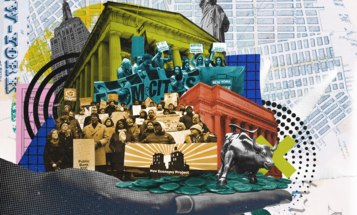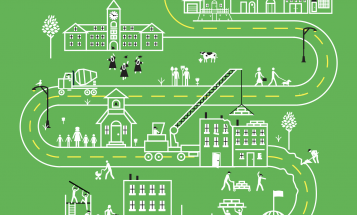
For all the talk about saving Social Security for today's young workers, there has been surprisingly little attention paid to a major discrepancy in the apparent youth consensus for privatization.
Why is our generation the only one to simultaneously support President George W. Bush's most radical domestic policy agenda -- 55 percent to 42 percent according to a recent USA Today poll -- and back John Kerry for president? A closer look at our values may help make sense of the puzzle.
Conservative organizations have touted the fact that two-thirds of us don't think Social Security will survive to benefit us as proof of the system's failure. Yet the only thing our doubts prove is that we've gotten the message. Under attack throughout our lifetimes, Social Security is the cornerstone of a "big government" declared dead just as most of us began paying taxes. The assault on the program is part of a successful 30-year campaign that has shaped the world we've come of age in.
Free-market policies and anti-government rhetoric have bred a New Economy that we know full well means less security and more risk. Less than half of my generation has health benefits at work, and those lucky enough to get retirement benefits contribute to 401(k)s that, unlike defined-benefit plans, make no guarantees in return. We're right to be doubtful about the future of a social insurance program in the go-it-alone America we've inherited.
We're also right to be worried about retirement security. The data show that retirement wealth has fallen for all but the wealthiest Americans over the past 20 years, but young people don't need to see the numbers. We already see our parents approaching retirement paying second mortgages and cashing out 401(k)s to help us pay for college. And that's not to mention our grandparents, who have all the social contract benefits we may never get -- union pensions, employer health benefits and full Social Security checks -- but are still going into credit-card debt to keep up with costs of a health care marketplace run amok. The only certainty of our young lives has been that public policy will abdicate responsibility to the market time and time again.
Enter the rhetoric of Bush's Ownership Society, which walks and talks like a government solution to the shedding of benefits on the job. "Adding" private accounts to Social Security sounds like guaranteeing everyone a 401(k)-type pension that the government will hold safe for you, no matter how many companies hire or fire you. And in fact, the Universal Retirement Savings Accounts proposed by congressional Democrats and President Bill Clinton in the late 1990s would have been just that: progressive ways for the 49 percent of working Americans without employer pensions to save on top of Social Security.
Of course, the reality of the administration's privatization proposal is much less comforting, and if the whole truth were told, our support would undoubtedly dry up. When the reality of private accounts was explained to young adults in a new Rock the Vote-AARP poll, young respondents rejected them outright. We didn't want the guaranteed benefit to be cut for anyone (as it would be, by as much as 40 percent for the average earner under the administration plan, according to the Center for Economic Policy Research).
Those young survey respondents' reluctance to deliver the death knell to Social Security is a telling reflection of our generation's moral values (yes, we have them). The children of the New Economy have responded to the economic disparity and social insecurities in our schools, neighborhoods and workplaces with a backlash against government bashing.
According to a 2002 Kaiser Family Foundation poll, to a greater degree than any other age group, a majority (69 percent) of 18- to 29-year-olds want bigger government with more services, and 63 percent believe that government ought to do everything possible to improve the standard of living for all Americans. To a greater degree than our elders, we trust the government to do what is right most or all of the time.
That trust appears to be greatly misplaced in an administration that would fabricate a crisis and offer a false solution that could make retirement even more risky and economically stratified in the future. By couching his plan in "Save the Children" language, the president is obviously hoping that our generation will support privatization without too much curiosity about the consequences.
Democrats, meanwhile, are missing an opportunity to rally a generation of their faithful. They could easily explain the dangers of privatization to us without ceding innovation to conservatives. They could offer a bold plan for portable benefits, such as governmentseeded universal retirement savings accounts paid for with a tax on the wealthiest estates. Such a solution would recognize both the free-market economy we've inherited and our pro-government, common-solutions values, which have been shaped in reaction to it.



